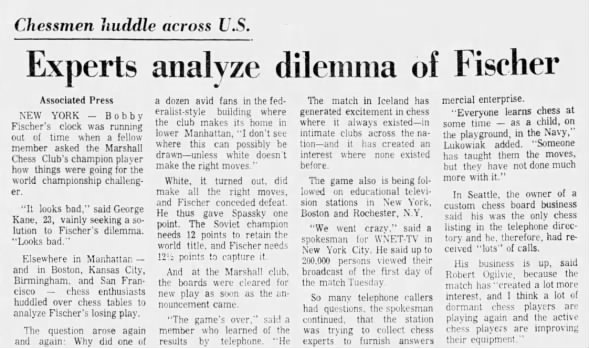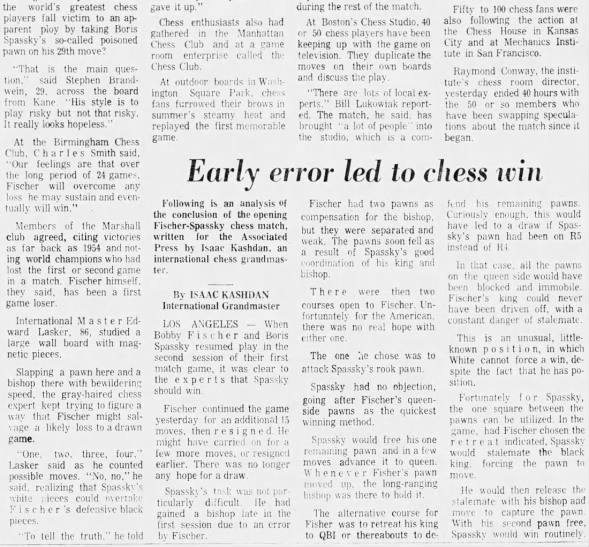The Arizona Republic Phoenix, Arizona Thursday, July 13, 1972 - Page 4
Chessmen Huddle Across U.S.--Experts Analyze Dilemma of Fischer
(AP) New York — Bobby Fischer's clock was running out of time when a fellow member asked the Marshall Chess Club's champion player how things were going for the world championship challenger.
“It looks bad,” said George Kane, 23, vainly seeking a solution to Fischer's dilemma. “Looks bad.”
Elsewhere in Manhattan — and in Boston, Kansas City, Birmingham, and San Francisco — chess enthusiasts huddled over chess tables to analyze Fischer's losing play.
The question arose again and again: Why did one of the world's greatest chess players fall victim to an apparently ploy by taking Boris Spassky's so-called poisoned pawn on his 29th move?
“That is the main question,” said Stephen Brandwein, 29, across the board from Kane. “His style is to play risky but not that risky. It really looks hopeless.”
At the Birmingham Chess Club, Charles Smith said, “Our feelings are that over the long period of 24 games, Fischer will overcome any loss he may sustain and eventually will win.”
Members of the Marshall club agreed, citing victories as far back as 1954 and noting world champions who had lost the first or second game in a match. Fischer himself, they said, has been a first game loser.
International Master Edward Laster, 86, studied a large wall board with magnetic pieces.
Slapping a pawn here and a bishop there with bewildering speed, the gray-haired chess expert kept trying to figure a way that Fischer might salvage a likely loss to a drawn game.
“One, two, three, four,” Lasker said as he counted possible moves. “No, no,” he said, realizing that Spassky's white pieces could overtake Fischer's defensive black pieces.
“To tell the truth,” he told a dozen avid fans in the federalist-style building where the club makes its home in lower Manhattan, “I don't see where this can possibly be drawn—unless white doesn't make the right moves.”
White, it turned out, did make all the right moves, and Fischer conceded defeat. He thus gave Spassky one point. The Soviet champion needs 12 points to retain the world title, and Fischer needs 12½ points to capture it.
And at the Marshall club, the boards were cleared for new play as soon as the announcement came.
“The game's over,” said a member who learned of the results by telephone. “He gave it up.”
Chess enthusiasts also had gathered in the Manhattan Chess Club and at a game room enterprise called the Chess Club.
At outdoor boards in Washington Square Park, chess fans furrowed their brows in summer's steamy heat and replayed the first memorable game.
The match in Iceland has generated excitement in chess where it always existed—in intimate clubs across the nation—and it has created an interest where none existed before.
The game also is being followed on educational television stations in New York, Boston and Rochester, N.Y.
“We went crazy,” said a spokesman for WNET-TV in New York City. He said up to 200,000 persons viewed their broadcast of the first day of the match Tuesday.
So many telephone callers had questions, the spokesman continued, that the station was trying to collect chess experts to furnish answers during he rest of the match.
At Boston's Chess Studio, 40 or 50 chess players have been keeping up with the game on television. They duplicate the moves on their own boards and discuss the play.
“There are lots of local experts,” Bill Lukowiak reported. The match, he said, has brought “a lot of people” into the studio, which is a commercial enterprise.
“Everyone learns chess at some time — as a child, on the playground, in the Navy,” Lukowiak added. “Someone has taught them the moves, but they have not done much more with it.”
In Seattle, the owner of a custom chess board business said his was the only chess listing in the telephone directory and he, therefore, had received “lots” of calls.
His business is up, said Robert Ogilvie, because the match has “created a lot more interest, and I think a lot of dormant chess players are playing again and the active chess players are improving their equipment.”
Fifty to 100 chess fans were also following the action at the Chess House in Kansas City and at Mechanics Institute in San Francisco.
Raymond Conway, the institute's chess room director, yesterday ended 40 hours with the 50 or so members who have been swapping speculations about the match since it began.

 Chessmen Huddle Across U.S.--Experts Analyze Dilemma of Fischer 13 Jul 1972, Thu Arizona Republic (Phoenix, Arizona) Newspapers.com
Chessmen Huddle Across U.S.--Experts Analyze Dilemma of Fischer 13 Jul 1972, Thu Arizona Republic (Phoenix, Arizona) Newspapers.com























